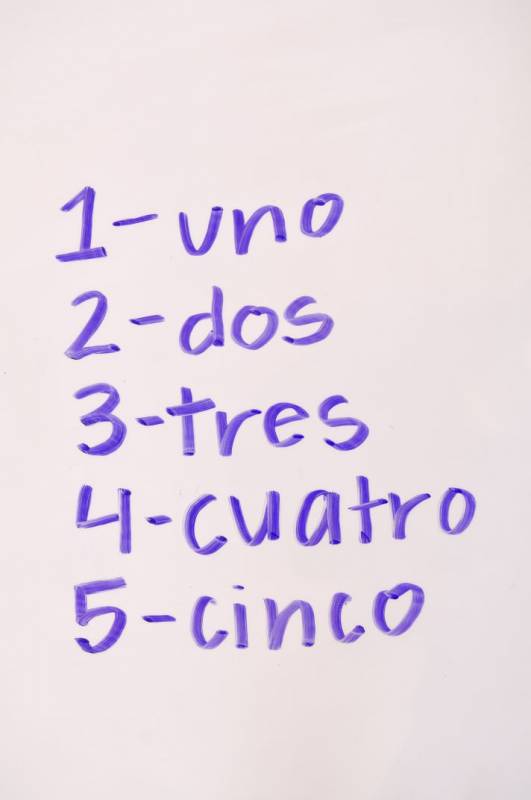article_detail
Spanish by numbers: Learn how to say 1-100 and speak like a Spaniard
The ultimate language hack to boost your Spanish speaking skills by learning just a few key numbers
 Once you’ve learnt some basic Spanish, you’ll be eager to find new words and phrases that you can show off to your friends and people you talk to in Spanish.
Once you’ve learnt some basic Spanish, you’ll be eager to find new words and phrases that you can show off to your friends and people you talk to in Spanish.However, it can sometimes be hard to take your Spanish to the next level because Spanish speakers use so many colloquial idioms on a daily basis that can be difficult to understand – both in a literal sense and their metaphorical meaning.
Luckily, there are many such phrases which simply require you to remember a few simple numbers in order to start sounding like a proper Spaniard.
Some of these phrases have direct translations into English, which makes them easier to memorise, while others take a bit more explaining to understand.
Are you ready to begin? 3, 2, 1...
- Con un par (de cojones): The word ‘par’ in Spanish means ‘pair’, so if someone has a pair they are said to be very brave or brazen. A pair of what we’ll leave to your imagination (hint: it’s not playing cards!).
- Tres son multitud: This one’s fairly easy to translate, and equates fairly well to the english expression ‘Three’s a crowd’.
- Cuatro: Four is a number that is used metaphorically in Spain to say there is not much of something. The typical example is ‘Había cuatro gatos’, meaning there were not a lot of people there.
- Ocho/mil: In contrast, the number eight (and also the number 1,000) is used as a way to say there’s a lot of something, e.g. ‘¡Te lo he dicho ocho veces ya!’ (‘I’ve already told you eight times!’) or ‘Esto es mil veces mejor’ (‘This is a thousand times better’). One thousand is understandable as a big number, but why eight? Why not, but it’s worth noting that it’s twice as many as four. Try combining for maximum effect, e.g. 8,000 (‘ocho mil’).
- Con esto y un bizcocho, hasta mañana a las ocho: A very Spanish way to say either goodnight, goodbye, or that you’ve had enough or something is finished. Literally translated as ‘With that and a cake, until tomorrow at eight’, the main charm of this Spanish saying comes from the fact that it rhymes, but it’s also a nice way to clock off for the day, saying that nothing else will be done until 8am the next morning.
- Me cago en diez: This Spanish phrase uses the word for ‘ten’ to replace the similar-sounding ‘Dios’, which means ‘God’, to create a nicer, slightly less rude way of swearing. The literal meaning would be something like ‘I shit on ten’, but figuratively it is used in a similar way to ‘gosh darn it’ or ‘for goodness sake’ in English.
- El ONCE: The ONCE – Spanish for ‘eleven’ – is the name of the lottery tickets which are generally sold by blind people. You will easily recognise them by the green jackets that they wear. The ONCE is a way to provide visually impaired people with gainful employment, and part of the money from the sales of the lottery tickets goes towards the ONCE charity foundation. The name comes from the initials of the ‘Organización Nacional de Ciegos Españoles’ (‘National Organisation for Spanish Blind People’).
- Hacer el trece-catorce: Finally, to ‘do the thirteen-fourteen’ in Spanish means something like ‘to pull the wool over somebody’s eyes’ or ‘to trick someone’.
Loading
Sign up for the Spanish News Today Editors Roundup Weekly Bulletin and get an email with all the week’s news straight to your inbox
Special offer: Subscribe now for 25% off (36.95 euros for 48 Bulletins)
OR
you can sign up to our FREE weekly roundup!
Read some of our recent bulletins:
Discount Special Offer subscription:
36.95€ for 48 Editor’s Weekly News Roundup bulletins!
Please CLICK THE BUTTON to subscribe.
(List price 3 months 12 Bulletins)
Read more stories from around Spain:
Contact Spanish News Today: Editorial 966 260 896 /
Office 968 018 268






















